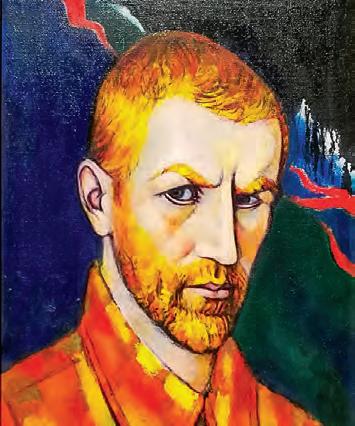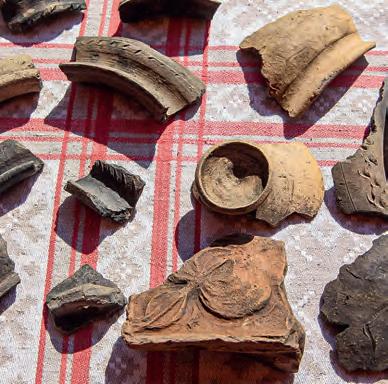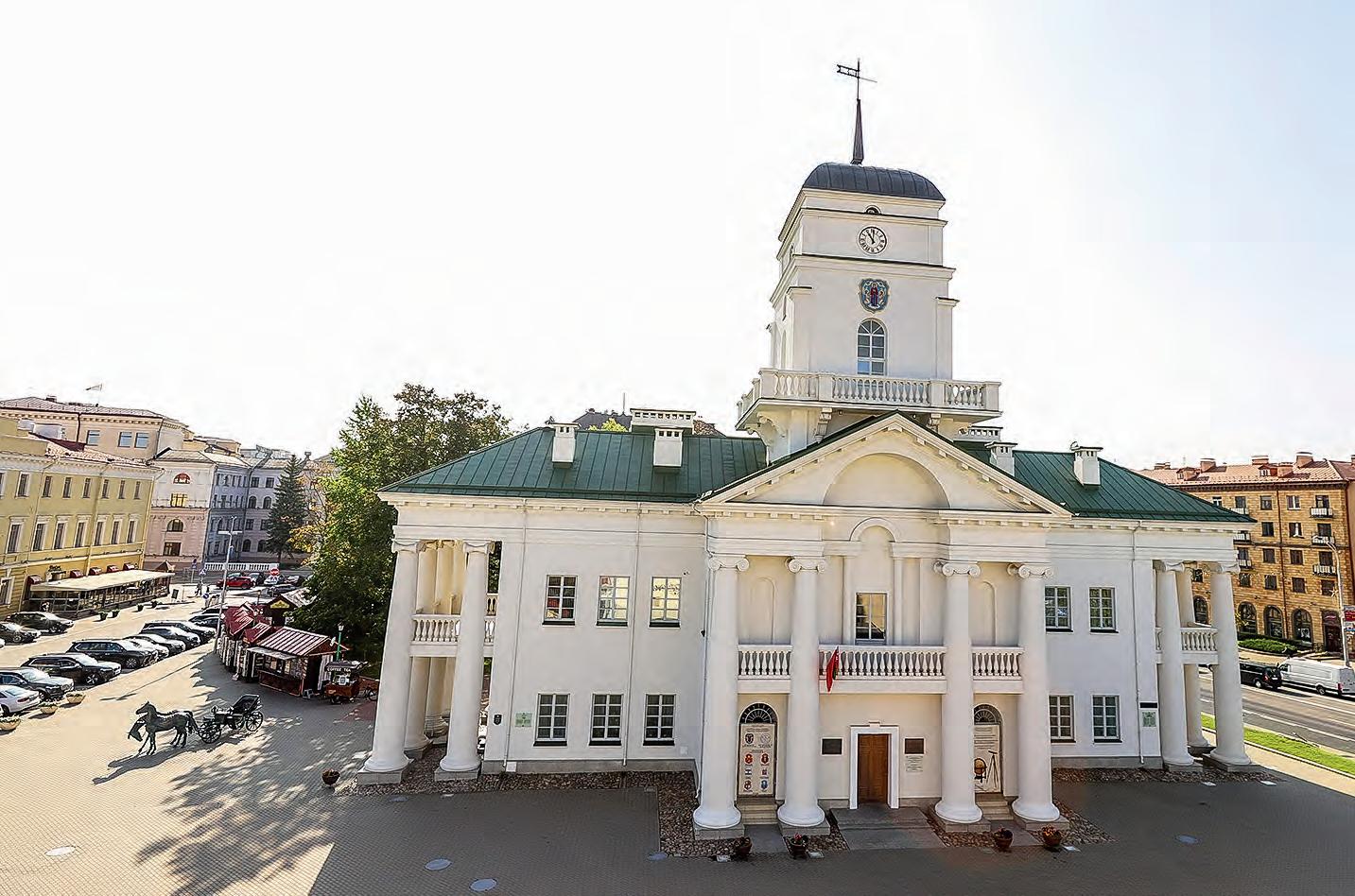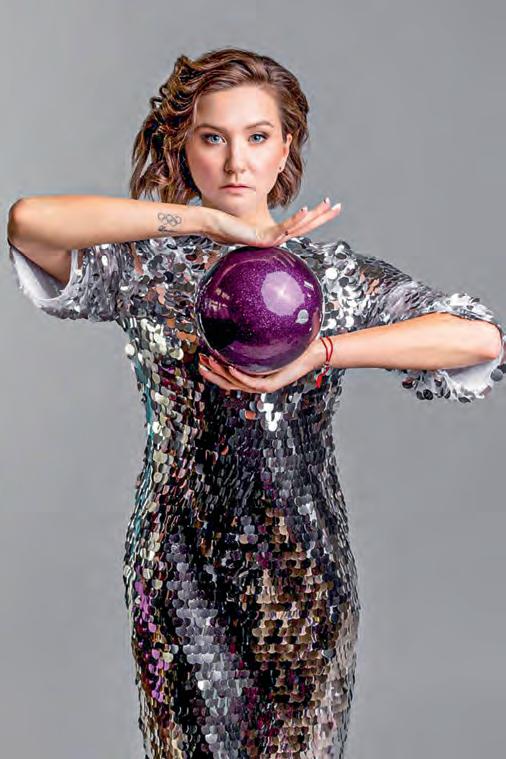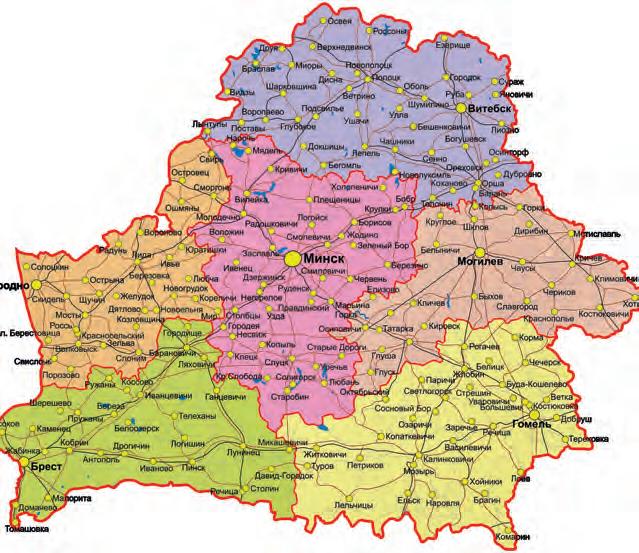
13 minute read
Living and working in a new way
The pandemic has affected almost everyone’s life. But it has affected the elderly the most. Older people, who have many concomitant diseases are forced to stop or minimize their contact with the outside world. They really miss live communication with friends, relatives and neighbours. Our correspondent visited the Kopyl Territorial Center for Social Protection of Population in the Minsk Region, and saw how they work with their under-the care in today’s difficult conditions.
Home University
Advertisement
— We have done everything possible for the elderly not to feel forgotten and neglected. We are introducing new forms of work. In particular, “Home University”, a distance form of work, has proved its worth,— says Svetlana Malinovskaya, the director of the institution. — There are 59 people in our department, including 6 men. The age of the visitors ranges from 60 to 86. There are four hobby groups and seven hobby clubs, and three schools. Due to the sanitary and epidemiological situation, we opened a distance learning school “Home University”. We started by talking to everyone who wanted to enroll. In the end 30 people gave their consent. We sent a written notice to each of them that they were enrolled in the school. This document specifies all the stages of our work. They include the history of Kopyl and the district, medicinal plants, and a healthy way of life,— says Valentina Nikolaenya, head of the day-care department of the Territorial Center for Elderly Citizens.
The students’ knowledge of the history of the region and their small motherland is tested. At first, the employees of the center provided them with the necessary information on the topic and tests with the questions to be answered. The first stage began on November 6 and ended on December 22. The participants were then presented with certificates of completion of the e-learning school and the winners were awarded prizes. At the same time, the Territorial Center for Social Protection of Population staff conducted a survey among the elderly, whether they liked studying at the distance school and what topics they think should be added to the course. And they received a lot of suggestions.
I should add that all precautions against covid infection are taken with the help of social mail, both among the elderly and among the staff. Specialists drop notices into the mailboxes where addressees live. — Each topic contained ten questions. One point was awarded for the correct answer. Then the certificates were handed out. In addition, thanks to the sponsors, each participant received a disposable mask and gloves.
Meanwhile, I glanced at the exercise book with the students’ marks. — So you have only excellent students! How do you determine the winners? — The matter is that they all came down to the matter very dutifully — the expert on social work Alla Grigoryevich supported the conversation.— At first wrote down answers in a questionnaire with a pencil and waited for the children to be convinced, that they had done all correctly. And then outlined the letters with a pen.— Our clients took a very active part in the distance school. For example, one 84-year-old woman called to say that she had completed her task and was ready to hand it in. She only got it yesterday. She would wait impatiently at the window, because she knew
that on such a day at a set time our staff would come with another assignment. — What is the benefit of this programme for the elderly? — I ask my interlocutors. — It is an opportunity to occupy oneself during a pandemic. The promotion of a healthy lifestyle and active longevity is also important. In addition, they gain new knowledge, useful information. For example, medicinal herbs. We give them information about the properties of each herb, what good and harm it can do to the body. A healthy way of life includes many things — healthy sleep, good quality and proper nutrition, active lifestyle.
No contact with the elderly has been lost
— The coronavirus pandemic has not hindered our work with elderly citizens, we have not lost contact with them,— assured Svetlana Malinovskaya.— In this department people are under special patronage, control and care. Specialists call them every day, ask about their state of health and what they need. By the way, there is a telephone hotline at the center, we fulfill requests all over the district, deliver medicines, food, basic necessities, sanitary and hygienic means.
During the first wave of the coronavirus, our beneficiaries had a panic, they refused to attend classes and clubs, admits Svetlana Stanislavovna. Now, thanks to the educational programme, people understand that, in principle, life has not stopped, it continues, and that doctors know how to fight the new disease. But we constantly remind them that first of all it is necessary to take precautions. Not a single elderly person went outside without a respirator, even before the introduction of the mandatory mask regime.
During the warm season, the center’s staff introduced outdoor activities. For example, together with staff of the local museum, they conducted guided tours of the city’s streets for one or two people. They told them about the history of a particular street, in whose honour it was named, what historical events took place there, what historical and architectural monuments are situated there. Even if the epidemiological situation does not change, this practice is planned to continue and distance learning will take another form.
A social worker is a kind of a psychologist
— There are 116 social workers in the Home Social Services Department, who provide services to 1104 elderly citizens. The work of the social workers, however, has not changed during the pandemic. They visit their under-the care, help them with household chores, cook meals, bring medicines, food and household goods. There are issues that are not part of their duties. For example, to repair something in the house, to fix the roof. In this case they help to find the necessary specialist. — We have four social stations in four villages of the district. There are supervisors here who monitor the work of social workers in the departmental area and ensure that the services are accessible. If complex, emergency situations arise, we do not need to go there, all the issues will be resolved by the inspector, — says Olga Sakovich, head of the social assistance at home.— Grozovo has a definite social protection system in place. In addition to the social center, a group home for elderly citizens was opened in 2017 with a capacity of six people. In a critical situation, we can accommodate up to 11 people there. A social worker comes there every day, cleans and cooks.
All social workers are provided with bicycles, personal protective equipment, change masks, everyone understands that they have no right to put the health of elderly people at risk.
Social workers have always been a bit of a psychologist, even more so now. They regularly hold talks with the elderly in care about safety rules, wearing masks and gloves when they go out and even when children arrive. They ask them to remind their children and grandchildren about it as well. They also reassure people not to get depressed or panicky. They explain that they have reliable helpers and that they will help to find a way out of any situation. The social workers do not only fulfil the requests of those who are served at the center. Everyone who needs help calls them and they do not refuse anyone. For example, a call from a citizen was like a cry from the heart, saying that all the family members are sick and there is no one to bring them food. — We haven’t left anyone alone with
ZVIAZDA.BY
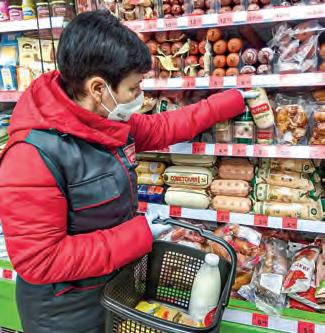
their problems,— says Svetlana Stanislavovna. We have no questions about what to do in this or that situation, we have worked out all ways out of the predicament. If there are difficulties in delivering medication to someone, the hospital informs us about it. In other words, we work shoulder to shoulder with our social partners. Public organizations such as regional associations of the Belarusian Union of Women and the Belarusian Red Cross do not leave us unattended.
The center takes care not only of the elderly. There is also care for its workers. “We, more than anyone else, have to be in the ranks. If difficult situations arise, we have to help people. As of today, the flows of people in our institution are separated so that they do not come in contact with each other. Different entrances and exits are provided for that. We also take the temperature every morning. In the autumn we vaccinate our staff against seasonal influenza. We also work closely with the district departments of the Ministry of Emergency Situations, Internal Affairs and Public Health. The village councils are our best friends as well,” summed up Svetlana Malinovskaya. By Tatyana Lozovskaya
ONE HUNDRED SHADES OF WHITE
A random photo on a mobile taken in the medical changing room of a covid zone of a hospital touches the heart. It depicts a captured moment. In the language of gazes, an unusual tenderness is felt. It’s simple: a mother doctor puts her colleague-daughter in a dazzling white outfit and gives a mute instruction. “Zviazda” found the heroes of the photo in the Gomel Region, in the town of Rechitsa.
Password — “volunteer”
For the first time in Belarus, a student volunteer squad to combat COVID-19 of the Gomel State Medical University was sent to help doctors of the Rechitsa Central Discrict Hospital. The volunteers are overwhelmingly natives of the district center, students of the medical faculty of Gomel “med”. Lazarevich became the main “liaison person” for the volunteers in their work in the infectious disease departments of the hospital and their supervisor in the “red” zone. She is a general practitioner and head of the infectious diseases department No. 2 of Rechitsa Central District Hospital. Patients with COVlD-19 are treated there. Tatyana is also a mother! Her daughter Polina Lazarevich is a third year student of the medical faculty of the Gomel Medical University. Such, as they say in military slang, “newbies” were not accepted to the volunteer squad members till now. But the girl proved that she could be a reliable partner in the common team. Now she studies five days a week as a third-year student (the course is considered the most difficult in the “med”), and on weekends she works in the “covid shift”. Volunteering in the squad is not counted as a training practice and is not paid. Simply helping those in need, Pauline believes, is a natural inclination of her soul. Compassion for people is rooted in her genes. The Lazarevichis are a family dynasty of doctors, well known in the Rechitsa District. After graduation, the girl will start the third generation of doctors. — I had no chance, they say,— Polina Lazarevich laughs when I call her after the classes.
ZVIAZDA.BY

On the “avatar” of the call in my mobile, a photo pops up: a very beautiful long-haired girl, a cover model. Even a “hazmat outfit” suits her very well. — Lazarevich is the surname of my grandfather Vladimir Vladimirovich,— Polina explains.— He is a surgeon, headed the Rechitsa Central District Hospital for more than 25 years. Dad is Dmitry Vladimirovich, head of the endoscopic department of Rechitsa Central District Hospital. My mother, Tatyana Lazarevich, has been working with patients with coronavirus infection since the first wave. Interestingly, my mother is from Mozyr and my father is from Rechitsa. They met at the university, where I now go, some-
times to the same teachers,— says the student.
Any sandpiper is great in his own swamp
The Rechitsa volunteer anti COVlD-19 squad has, apart from Polina Lazarevich, three female 6-year students of the Gomel Medical University. They also have a local boyfriend — a friend of Polina, also a medical student, who is in his second year at university.
— Our job is not to act as nurses or doctors, we cannot give advice or prescribe treatment. Our job is to provide information, education and emotional support to patients,— says Polina.— We explain the peculiarities of the course of coronavirus. We explain why rehabilitation is necessary. We teach how to do breathing exercises and physical therapy exercises.
The volunteer draws attention to the fact that they are in charge, among other things, of keeping patients in the right position on the bed. This makes them feel better and promotes a quicker recovery. — It seems there are a lot of reports online today about coronavirus. But when we convey the necessary information to the patients, many say that it’s the first time they have heard about it, as previously they only paid attention to the rules of hygiene and hygiene regime. By the way, it is not only the elderly who respond, but also the younger patients,— says the student.
She says that in general, the volunteers keep a close eye on the implementation of the recommendations: where there was a married couple, and later, as I was walking in the corridor, I noticed that they were doing everything as I had taught them. It really made things easier for them.
Polina Lazarevich also recalls her first independent entry into the “red” zone: — You can be prepared from the informational point of view, but from the psychological one, speaking to a patient is sometimes a challenge for a future doctor,— says Polina about how she, as a student, lacked confidence at first, caused by her lack of experience of such a relationship.— I came to the ward, and there were only elderly people there, and they all could barely hear. At first I was confused, but I pulled myself together, explained everything, repeated it for each person individually, but very loudly. Afterwards I was worried about the visit.
The volunteer tells us how happy every team member is when patients make contact: — There are those who ask a lot of questions. You tell them, for example,

— I once worked on my own in a ward about breathing exercises and they say, “Why?” They ask you to explain in more detail: how it affects the course of the disease, how the body will react, what can happen if they don’t do rehabilitation. It is more pleasant to work with people like this, because there is a dialogue.
Volunteer work is also known to act as a psychological relaxation session for patients. Although crowded wards do not facilitate the release of worries or fears, an experienced person perceives their treatment more relaxed. Volunteers help to equip them with knowledge, to understand that a positive emotional state of the patient will help doctors to improve their state of health. — It is difficult to work not with the elderly or the young, but with those who “shut down” and remain alone with the disease,— says Polina.
Reflection to the accompaniment of the train…
The student volunteer has already spent three weekends in the volunteer group. Members of the group, sixth-year students, have already started working but there is a common schedule for all of them. Now their shift is once every fortnight. There is always a need for voluntary work. I ask the girl a traditional question: what does the experience of volunteering at the pandemic give you? — I confess to you that when I go home for the weekend on the train, I prepare mentally, I think over what today’s day may bring. Yes, I am afraid, but not of the possibility of contracting the coronavirus. I think all medics are mentally prepared for that. While I am struggling with the fear of “speaking up” in front of patients, I am learning to listen to and hear them, to calm them down in time with an apt response to their questions. After all, I know from my grandfather: awareness and competence are essential for a doctor. You have no right to “infect” patients with your excitement. This kind of work prepares me to master to be a real doctor.
Polina recalls what her mentor, Tatyana Lazarevich, teaches the volunteers: — My mother directs us that our work helps to relieve panic anxiety in patients. It is important to convince them that even if 75% of the lungs are damaged, it is not a verdict. This is a reason to follow the doctors’ instructions firmly, find the strength to fight and change the situation for one’s own benefit. By Natalya Kaprilenko



